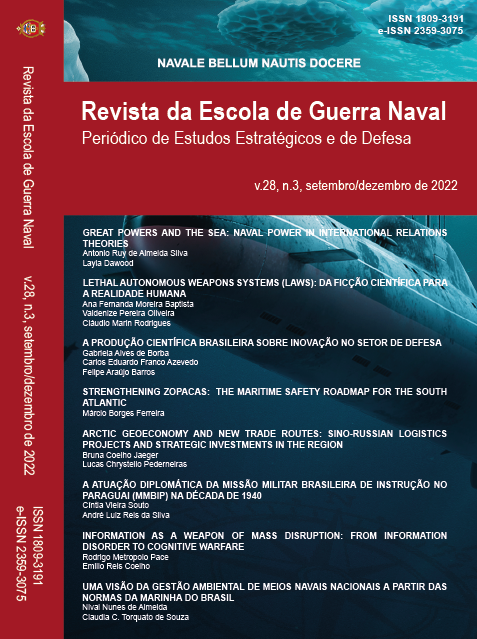Strengthening ZOPACAS:
the Maritime Safety Roadmap for the South Atlantic
Keywords:
Maritime Safety, High Seas, Illegal-unreported- unregulated Fishing, Oil spill, International Alliances.Abstract
Population growth poses one of the greatest challenges for human survival in the 21st Century and, increasingly, man is turning to the sea for food and energy. As the ocean has no physical boundaries, it is inevitable that some of these activities will affect the seashore and jurisdictional waters of coastal States, negatively affecting those nations’ territorial waters, with all the economic and social ramifications that entails. Recent studies point to most threats to maritime jurisdictions coming from undetected acts perpetrated on the high seas. Therefore, this article looks at potential threats in this domain and measures to mitigate those threats, in full compliance with the provisions of the United Nations Convention on the Law of the Sea. That fact, and the limitations imposed by international law, make it impossible for any one country to address these issues alone. Increasingly States need the support of hemispheric alliances, such as the Organization of American States, and transboundary water agreements such as the South Atlantic Peace and Cooperation Zone. Leveraging those alliances and agreements to reinforce maritime safety is the surest way to foster cooperation among developing nations, including those with coasts along the South Atlantic, and to prevent maritime threats from undermining their future.Downloads
Published
2023-05-09
Issue
Section
Artigos
How to Cite
Strengthening ZOPACAS:: the Maritime Safety Roadmap for the South Atlantic. (2023). Revista Da EGN, 28(3), 615-642. https://portaldeperiodicos.marinha.mil.br/index.php/revistadaegn/article/view/3863








 Esta obra está licenciada com uma Licença Creative Commons Atribuição 4.0 Internacional.
Esta obra está licenciada com uma Licença Creative Commons Atribuição 4.0 Internacional.